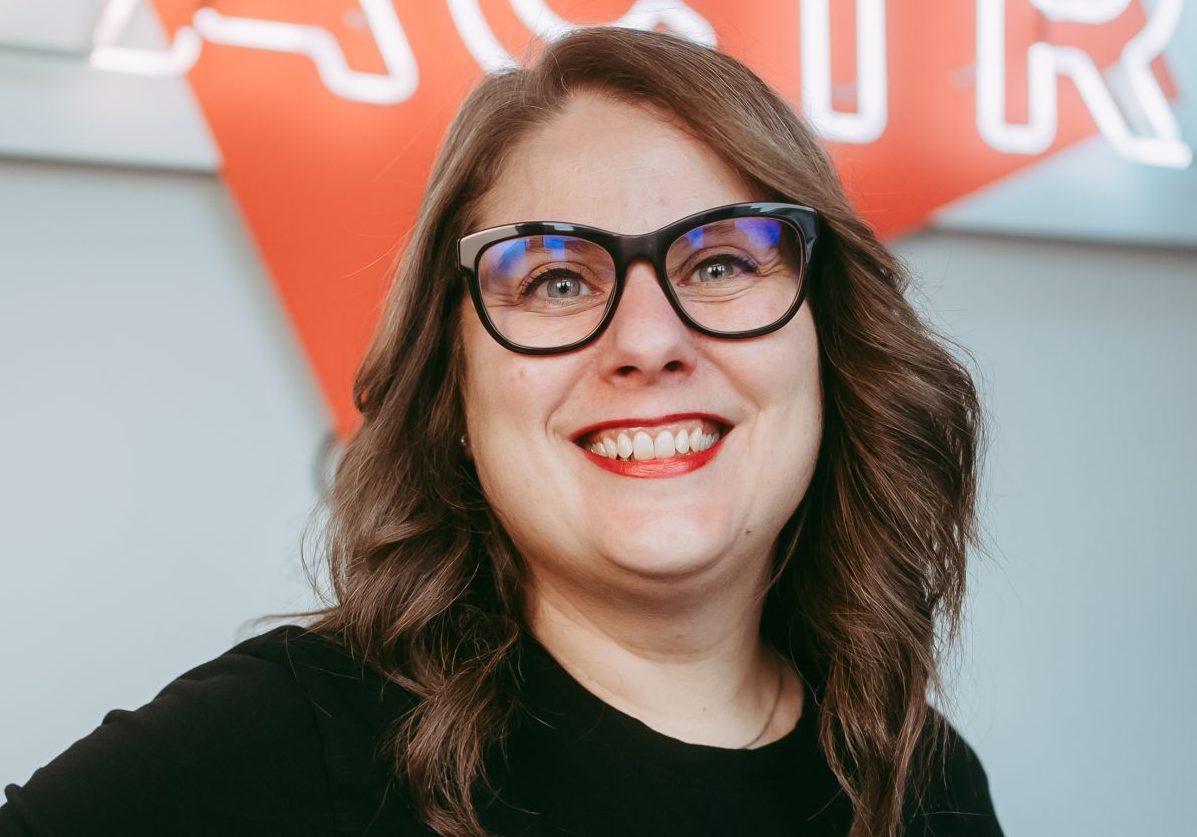As Creative Director of Brand Experience at the Factry, Caroline Ducharme is both the keeper of the “Factry spirit” and the one who constantly pushes its limits. She is endlessly curious and encourages everyone to break out of their usual reflexes thanks to a personality that is allergic to conventional wisdom.
How do you define your role at the Factry?
I am responsible for the experience that everyone who comes in contact with the brand has! I’m responsible for the overall effect on people, whether it’s in our offices, during online workshops or through our communications.
For example, when a company requests customized training, I help ensure that we offer courses that are specifically designed to meet the client’s objectives, and that are also original and personalized.
Among the ten ingredients of creativity identified by the Factry, “Break a rule” is one of your favorites. Why is that?
This ingredient is my way of being and living in the world.
Paradoxically, I am an extremely docile person-authority works very well with me. I am a very good citizen, a very good employee… BUT… Without wanting to, I have a little rebellious side that expresses itself through the multitude of questions I ask. I need to understand why things are done one way rather than another.
I think it’s my way of identifying if there are rules that should be broken. Because if the rationale doesn’t seem coherent, aligned with our needs, is holding us back or hurting us, then I’m not compliant at all.
What does that mean to you?
For me, it is first and foremost about not doing things just for the sake of conformity. Having the courage to question things is breaking a rule.
“Why?” is the most important question in life, and yet it’s also perhaps the one that annoys people the most when asked. Because questioning something often means that things are likely to get complicated.
It’s interesting to see the faces of the participants in the Factry trainings change every time we get to “Break a Rule” in the Ten Ingredients of Creativity presentation.
What do you think makes people uncomfortable?
I think their first instinct is to think that we want to encourage them to do something illegal, like driving at 140 km/h on the highway. But that’s not it: rules are essential to the proper functioning of society.
On the other hand, when we try to innovate and be creative, we must know how to question them, to evaluate which ones deserve to be bypassed, improved, or broken in order to move forward.
When we have done our homework, we are able to choose wisely which rule to break, why and how. Take the example of the right turn at the red light: almost everyone had a slight concern at first, when Quebec changed the rule. It’s never comfortable to break a rule.
What is the risk associated with never breaking rules?
The risk is not innovating. Refusing to break any rules or codes means continuing to do things the way we’ve always done them-which, in my opinion, is not a good way to evolve.
You have to give yourself the right to make mistakes. Some “mistakes” have led to spectacular discoveries. Perpetuating the same ways of doing things or the same behaviors in order not to make mistakes, not to fail or not to underperform necessarily kills creativity.
According to my understanding, mistakes only exist in a context where we know the expected result (1+1 does not equal 3). Apart from that, does failure really exist?
Our society highly values good answers, and often denigrates mistakes, but innovation and novelty are rarely found in already existing answers and solutions; if we aim for an already known result, we don’t create anything new or better.
Should the world enter the age of the question?
I’m not saying we should question everything all the time, it’s about finding the balance, but it is indeed this kind of attitude that can create the conditions for us to grow.
In general, what kind of rules are the most dangerous for creativity?
Humans adapt to everything and, in my opinion, this is the danger. We quickly get used to rules, and sometimes we start following them blindly.
The most pernicious rule is the one that exists just because “that’s the way it is”, or “because that’s the way we’ve always done it”. Often, we don’t even realize that we are following a rule.
If we never update the codes that were put in place years ago to solve a problem that was relevant at the time, but has inevitably evolved, we are on the wrong track. And in order to identify the elements that deserve our attention, we need to ask the right questions.
In an innovation process, how do we help individuals and companies to get used to the idea of doing things differently?
Humans fundamentally need change, but their first reaction is almost always resistance. Since “breaking a rule” means changing things, it’s necessarily confronting at first.
My trick is to make sure that participants don’t realize that this is what we’re going to get them to do! It’s about getting them to draw conclusions by making them think about something parallel to their issue, or by proposing that they take a seemingly innocuous action… It’s a more effective and inspiring way to move forward.
There is a difference between saying you want to change things and actually being in the mental state that makes you ready to do so. When I design experiences, I try to make sure that, if the client’s mandate and goal are appropriate, the journey leads us naturally to where we want to go – that it allows participants to overcome their initial resistance, without forcing them.
And personally, do you have a surefire trick or ritual to get you back into a creative frame of mind even in the midst of the daily grind?
I have an insatiable curiosity. I am fed with so much information on a daily basis that when it comes to coming up with ideas, or solutions, I have a large pool to draw from.
An idea is usually born from a connection that the brain makes between two things, for example between a piece of information that we have learned and an experience that we have lived, or an emotion that we have felt. So, when our head is full, we increase our chances of having a good (or great!) idea.

